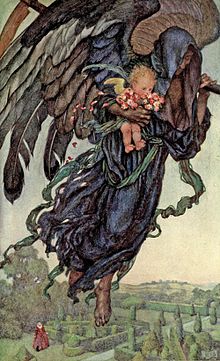To the Virgins, to Make Much of Time
| Wikisource has original text related to this article: |
"To the Virgins, to Make Much of Time" is a poem written by English Cavalier poet Robert Herrick in the 17th century. The poem is in the genre of carpe diem, Latin for "seize the day".
1648 text[]
Gather ye Rose-buds while ye may,
Old Time is still a-flying:
And this same flower that smiles to day,
To morrow will be dying.
The glorious Lamp of Heaven, the Sun,
The higher he's a getting;
The sooner will his Race be run,
And neerer he's to Setting.
That Age is best, which is the first,
When Youth and Blood are warmer;
But being spent, the worse, and worst
Times, still succeed the former.
Then be not coy, but use your time;
And while ye may, go marry:
For having lost but once your prime,
You may forever tarry.[1]
Theme: carpe diem[]

First published in 1648 as number 208 in a volume of verse entitled Hesperides, it is perhaps one of the more famous poems to extol the notion of carpe diem, a philosophy that recognizes the brevity of life and, therefore, the need to live for and in the moment. The phrase originates in Horace's Ode 1.11.
See also[]
- 1648 in poetry
- "To His Coy Mistress", a poem by Andrew Marvell on the same subject
- Lady Du Qiu
References[]
- ^ Herrick, Robert (1921). Moorman, Frederic William (ed.). The poetical Works of Robert Herrick. Oxford University Press. p. 84. Reprint of the first edition (1648) of Hesperides
External links[]
| Look up gather rosebuds in Wiktionary, the free dictionary. |
- 1648 poems
- English poems
